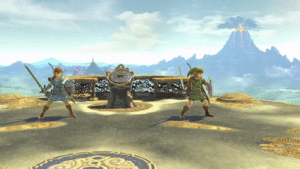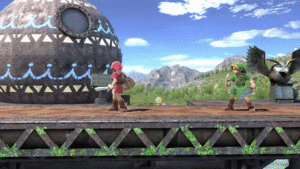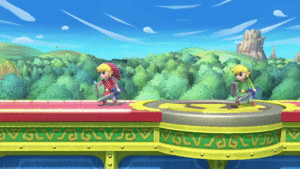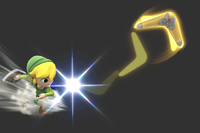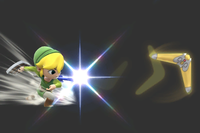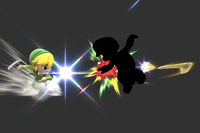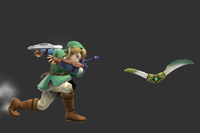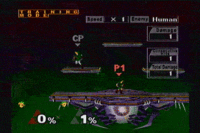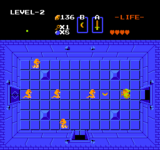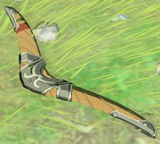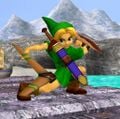Boomerang: Difference between revisions
mNo edit summary |
(→Origin) |
||
| (8 intermediate revisions by 6 users not shown) | |||
| Line 3: | Line 3: | ||
{{Infobox Special Move | {{Infobox Special Move | ||
|name=Boomerang | |name=Boomerang | ||
|image={{tabber|title1=Link| | |image={{tabber|title1=Link|content1=[[File:Link Side B SSBU.gif|300px]]|title2=Young Link|content2=[[File:Young Link Side B SSBU.gif|300px]]|title3=Toon Link|content3=[[File:Toon Link Side B SSBU.gif|300px]]}} | ||
|caption=The Links' Boomerangs in ''Ultimate''. | |caption=The Links' Boomerangs in ''Ultimate''. | ||
|user=[[Link]] | |user=[[Link]] | ||
| Line 9: | Line 9: | ||
|universe={{uv|The Legend of Zelda}} | |universe={{uv|The Legend of Zelda}} | ||
|interwiki=zeldawiki | |interwiki=zeldawiki | ||
|interwikiname= | |interwikiname=Zelda Wiki | ||
|interwikipage=Boomerang | |interwikipage=Boomerang | ||
}} | }} | ||
| Line 49: | Line 49: | ||
===As a custom move for [[Gale Boomerang]]=== | ===As a custom move for [[Gale Boomerang]]=== | ||
{{CustomSet/Single|Link|Side|name=Boomerang|desc | {{CustomSet/Single|Link|Side|name=Boomerang|desc=A normal boomerang with good attack power, but it won't pull opponents.|num=2}} | ||
# '''Boomerang''': A variation that lacks the wind effect, functioning identically to games prior to ''[[Super Smash Bros. Brawl]]''. It is stronger than the default version, but it loses the ability to pull objects and opponents towards Link. {{Main|Link (SSB4)/Side special/Custom 1}} | # '''Boomerang''': A variation that lacks the wind effect, functioning identically to games prior to ''[[Super Smash Bros. Brawl]]''. It is stronger than the default version, but it loses the ability to pull objects and opponents towards Link. {{Main|Link (SSB4)/Side special/Custom 1}} | ||
==Sticker== | ==Sticker== | ||
| Line 62: | Line 57: | ||
! Game | ! Game | ||
! Effect | ! Effect | ||
! | ! Fighter(s) | ||
|- | |- | ||
| Boomerang | | Boomerang | ||
| Zelda: Wind Waker | | Zelda: Wind Waker | ||
| {{SortKey|AttackWeapon+004}}{{TypeIcon|Weapon}} Attack +4 | | {{SortKey|AttackWeapon+004}}{{TypeIcon|Weapon}} Attack +4 | ||
| {{ | | {{StickerHead|Link|Zelda|Ganondorf|Toon Link}} | ||
|} | |} | ||
{{StickerPicBox|Boomerang|Zelda: Wind Waker}} | {{StickerPicBox|Boomerang|Zelda: Wind Waker}} | ||
==Glitches== | |||
The '''Boomerang glitch''' {{YouTube|mfJQzWQOxNk}} is a [[glitch]] in ''[[Super Smash Bros. Melee]]'' (version 1.1). It is a minor glitch discovered by Jimmymcjimthejim that causes {{SSBM|Link}}'s boomerang to get stuck to his arm, thus disabling his ability to throw it again. This glitch is caused by getting touched by a [[Poison Mushroom]], or in Tiny Melee, during the frame animation when Link is throwing his boomerang. The glitch may fix itself at times, and [[self-destruct]]ing will end it automatically. | |||
The [[boomerang superjump]] glitch can be performed by both Link and Young Link. | |||
==Reverse angle boomerang== | |||
[[File:Reverse angle boomerang.gif|thumb|Young Link utilizing the reverse angle boomerang to knock Link onto a motion-sensor bomb.]] | |||
The '''Reverse angle boomerang''' is an [[advanced technique]] in ''[[Super Smash Bros. Melee]]'' discovered by {{Sm|B-Run}}. To perform this technique, the boomerang must be thrown as close to directly down as possible without being completely vertical. If done correctly, the boomerang will go over Link's head on the return path and instead continue on a wide arch. Jumping and crouching are the most common methods to dodge the boomerang without abusing level geometry. Upward slopes and similar uneven terrain can make the technique easier to perform. Though both versions of {{SSBM|Link}} can do this, the technique is easier with {{SSBM|Young Link}} due to his shorter model allowing for a wider angle window. | |||
The main use of this technique is to surprise the opponent, particularly with [[edgeguarding]]. The average player likely will not expect the boomerang to continue at such an angle, forcing them to get hit or approach in a specific way that limits their options. While using this technique at close range is risky due to its slow startup, successfully pulling it off can interrupt the opponent, potentially ruining their combos and providing an opportunity for a counterattack. Young Link's exclusive angles can also be used to potentially catch players too high up to be hit normally depending on their trajectory. That being said, the boomerang not being retrieved means it can't be used again until it disappears, meaning Link is left without an important projectile and could potentially be left vulnerable because of that. | |||
The game itself indirectly teaches the player how to perform this technique, as it is essentially required to complete Young Link's ''[[Break the Targets]]'' course. | |||
==Origin== | ==Origin== | ||
[[File:Zelda Nes Boomerang Origin.png|thumb|160px|Link using the boomerang in the original ''The Legend of Zelda'' game.]] | [[File:Zelda Nes Boomerang Origin.png|thumb|160px|Link using the boomerang in the original ''The Legend of Zelda'' game.]] | ||
[[File:Link Boomerang (Breath of the Wild).png|thumb|left|160px|Link's boomerang from ''The Legend of Zelda: Breath of the Wild''.]] | [[File:Link Boomerang (Breath of the Wild).png|thumb|left|160px|Link's boomerang from ''The Legend of Zelda: Breath of the Wild''.]] | ||
{{iw|zeldawiki|Boomerang}}s have been one of Link's main weapons since the very first ''[[The Legend of Zelda]]'' game; while generally inferior to the [[Bow]] as a means of indirect attack, it is reusable, capable of pulling items back to Link, stuns enemies, and triggers switches, making it more of a tool than a true offensive weapon; enemies such as {{s|zeldawiki|Goriya}}s also possessed boomerangs as their main weapons as well. Some weak enemies could be defeated using the boomerang, and in some games the boomerang was capable of cutting through objects such as ropes and vines. | |||
The design used by adult Link in the original ''Super Smash Bros.'' and ''Melee'', as well as by Young Link, is based on its design in ''[[The Legend of Zelda: Ocarina of Time]]'', where it was the main dungeon item of {{s|zeldawiki|Inside Jabu-Jabu's Belly}}, the third dungeon. However, in ''Ocarina of Time'', only Young Link can use the boomerang; adult Link cannot. | The design used by adult Link in the original ''Super Smash Bros.'' and ''Melee'', as well as by Young Link, is based on its design in ''[[The Legend of Zelda: Ocarina of Time]]'', where it was the main dungeon item of {{s|zeldawiki|Inside Jabu-Jabu's Belly}}, the third dungeon. However, in ''Ocarina of Time'', only Young Link can use the boomerang; adult Link cannot. | ||
The design used by Toon Link is derived from the one featured in ''{{s|zeldawiki|The Legend of Zelda: The Wind Waker}}'', where it was the dungeon item of the {{s|zeldawiki|Forbidden Woods}}. | The design used by Toon Link is derived from the one featured in ''{{s|zeldawiki|The Legend of Zelda: The Wind Waker}}'' (known in ''Breath of the Wild'' and ''Tears of the Kingdom'' as the Sea-Breeze Boomering), where it was the dungeon item of the {{s|zeldawiki|Forbidden Woods}}. | ||
The design of Link's boomerang in ''Ultimate'' is based on the standard boomerang from ''{{s|zeldawiki|The Legend of Zelda: Breath of the Wild}}'', where it has no special attributes other than returning to the player after being thrown, although it can also be used as a melee weapon in close combat. | The design of Link's boomerang in ''Ultimate'' is based on the standard boomerang from ''{{s|zeldawiki|The Legend of Zelda: Breath of the Wild}}'', where it has no special attributes other than returning to the player after being thrown, although it can also be used as a melee weapon in close combat. | ||
| Line 152: | Line 160: | ||
[[Category:Toon Link (SSBU)]] | [[Category:Toon Link (SSBU)]] | ||
[[Category:Stickers]] | [[Category:Stickers]] | ||
[[es:Bumerán (movimiento)]] | |||
Latest revision as of 16:08, February 6, 2024
| Boomerang | |
|---|---|
The Links' Boomerangs in Ultimate. | |
| Users | Link Young Link Toon Link |
| Universe | The Legend of Zelda |
| Article on Zelda Wiki | Boomerang |
Boomerang (ブーメラン, Boomerang) is a special move used by Link, Young Link, and Toon Link. It is Link's neutral special move in Super Smash Bros., and his side special move in Super Smash Bros. Melee and Super Smash Bros. Ultimate, while it is also Toon Link and Young Link's side special move in every game that they appear in.
Overview[edit]
The boomerang is a useful tool for spacing opponents. One can tap the control stick while doing this move to increase its range, and tilt the stick up or down to aim it towards those directions. If the player dodges the boomerang as it comes back to them, it will continue flying and curving towards the direction they dodged in. Link can only have one boomerang on screen at any time; trying the attack again while a boomerang is out only results in Link doing his boomerang throwing animation without actually throwing anything.
Originally, Link took out the boomerang and merely tossed it with a slight overhanded toss, while as of Melee he instead swings it behind himself before tossing it forward sideways and somewhat underhanded.
Instructional quotes[edit]
| Tap | ||
| Increase range by tapping the Control Stick to the right. Control the angle of his throw with the Control Stick. | ||
| Does damage on the way out and on return. Change the angle with | ||
| Throws a boomerang diagonally. The control stick can be flicked for extra power and distance. | ||
| Throws a boomerang. He can even throw it diagonally. A flick of the stick can change the power and distance. | ||
| Deals damage on its way out and on its way back. Can be thrown diagonally. |
Customization[edit]
Special Move customization was added in Super Smash Bros. 4. These are the variations:
Toon Link[edit]
| 1. Boomerang | 2. Floating Boomerang | 3. High-Speed Boomerang |
|---|---|---|
| "Deals damage on its way out and on its way back. Can be thrown diagonally." | "Throw a boomerang that's slow to return. It'll vanish if it hits anything on its way back." | "Throw a high-speed boomerang that passes through fighters. Deals less damage than normal." |
- Boomerang: Default.
- Floating Boomerang: Flies slower with more control. More easily returns to Toon Link.
- High-Speed Boomerang: Flies faster and passes through multiple enemies, but is slightly weaker and only returns to the spot where it was thrown.
As a custom move for Gale Boomerang[edit]
| 2. Boomerang |
|---|
| "A normal boomerang with good attack power, but it won't pull opponents." |
- Boomerang: A variation that lacks the wind effect, functioning identically to games prior to Super Smash Bros. Brawl. It is stronger than the default version, but it loses the ability to pull objects and opponents towards Link.
Sticker[edit]
| Name | Game | Effect | Fighter(s) |
|---|---|---|---|
| Boomerang | Zelda: Wind Waker |
 Boomerang (Zelda: Wind Waker) |
Glitches[edit]
The Boomerang glitch [1] is a glitch in Super Smash Bros. Melee (version 1.1). It is a minor glitch discovered by Jimmymcjimthejim that causes Link's boomerang to get stuck to his arm, thus disabling his ability to throw it again. This glitch is caused by getting touched by a Poison Mushroom, or in Tiny Melee, during the frame animation when Link is throwing his boomerang. The glitch may fix itself at times, and self-destructing will end it automatically.
The boomerang superjump glitch can be performed by both Link and Young Link.
Reverse angle boomerang[edit]
The Reverse angle boomerang is an advanced technique in Super Smash Bros. Melee discovered by B-Run. To perform this technique, the boomerang must be thrown as close to directly down as possible without being completely vertical. If done correctly, the boomerang will go over Link's head on the return path and instead continue on a wide arch. Jumping and crouching are the most common methods to dodge the boomerang without abusing level geometry. Upward slopes and similar uneven terrain can make the technique easier to perform. Though both versions of Link can do this, the technique is easier with Young Link due to his shorter model allowing for a wider angle window.
The main use of this technique is to surprise the opponent, particularly with edgeguarding. The average player likely will not expect the boomerang to continue at such an angle, forcing them to get hit or approach in a specific way that limits their options. While using this technique at close range is risky due to its slow startup, successfully pulling it off can interrupt the opponent, potentially ruining their combos and providing an opportunity for a counterattack. Young Link's exclusive angles can also be used to potentially catch players too high up to be hit normally depending on their trajectory. That being said, the boomerang not being retrieved means it can't be used again until it disappears, meaning Link is left without an important projectile and could potentially be left vulnerable because of that.
The game itself indirectly teaches the player how to perform this technique, as it is essentially required to complete Young Link's Break the Targets course.
Origin[edit]
Boomerangs have been one of Link's main weapons since the very first The Legend of Zelda game; while generally inferior to the Bow as a means of indirect attack, it is reusable, capable of pulling items back to Link, stuns enemies, and triggers switches, making it more of a tool than a true offensive weapon; enemies such as Goriyas also possessed boomerangs as their main weapons as well. Some weak enemies could be defeated using the boomerang, and in some games the boomerang was capable of cutting through objects such as ropes and vines.
The design used by adult Link in the original Super Smash Bros. and Melee, as well as by Young Link, is based on its design in The Legend of Zelda: Ocarina of Time, where it was the main dungeon item of Inside Jabu-Jabu's Belly, the third dungeon. However, in Ocarina of Time, only Young Link can use the boomerang; adult Link cannot.
The design used by Toon Link is derived from the one featured in The Legend of Zelda: The Wind Waker (known in Breath of the Wild and Tears of the Kingdom as the Sea-Breeze Boomering), where it was the dungeon item of the Forbidden Woods.
The design of Link's boomerang in Ultimate is based on the standard boomerang from The Legend of Zelda: Breath of the Wild, where it has no special attributes other than returning to the player after being thrown, although it can also be used as a melee weapon in close combat.
Gallery[edit]
Toon Link using the Boomerang in Super Smash Bros. for Wii U.
Names in other languages[edit]
Trivia[edit]
- Link's boomerang in Smash 64 is one of three neutral special moves to be a side special in Melee, and one of six moves to have its directional input changed throughout the series. The other five are PK Fire, Pound, Rock Smash, Reflect Barrier and Explosive Flame.
Technical details[edit]
Link:
- Link (SSB)/Neutral special
- Link (SSBM)/Side special
- Link (SSB4)/Side special/Custom 1
- Link (SSBU)/Side special
Young Link:
Toon Link:
